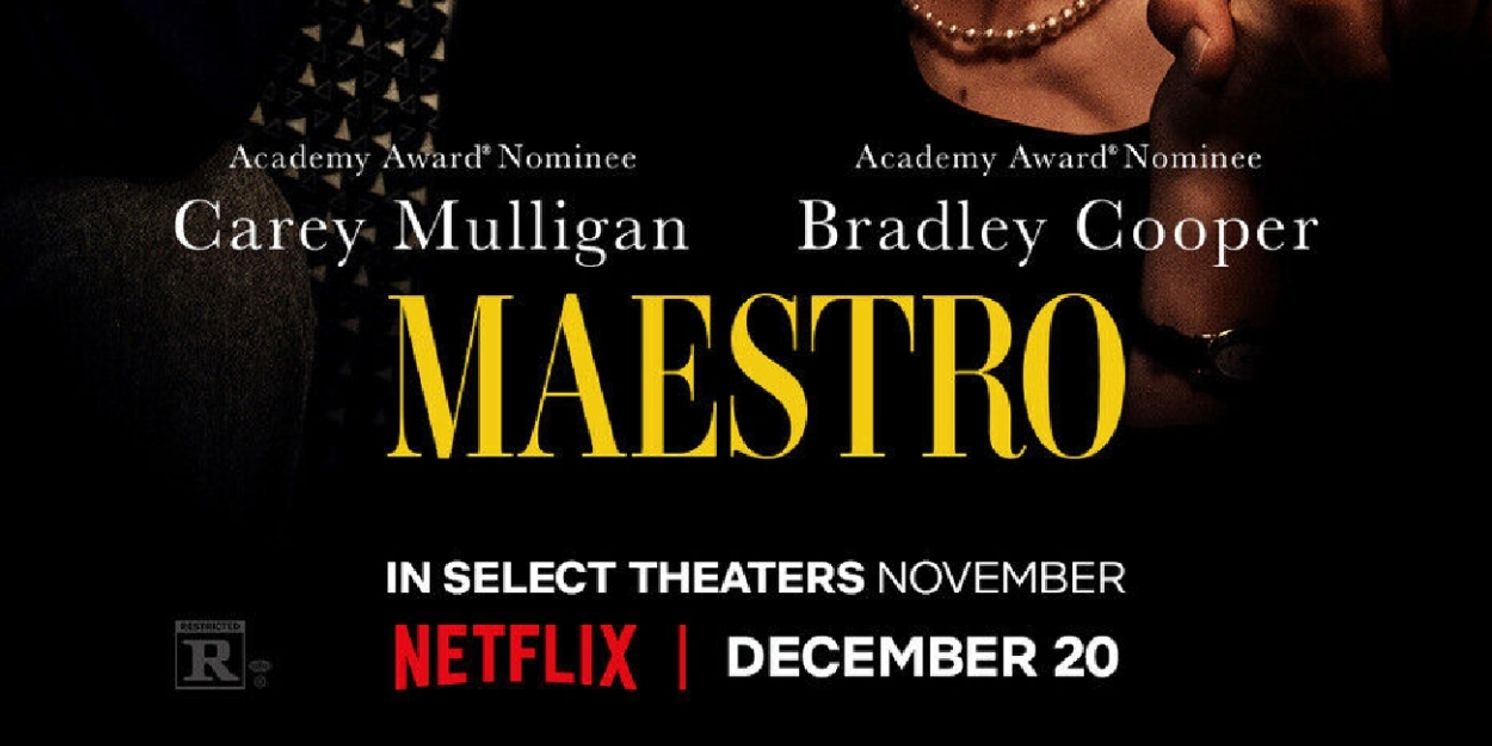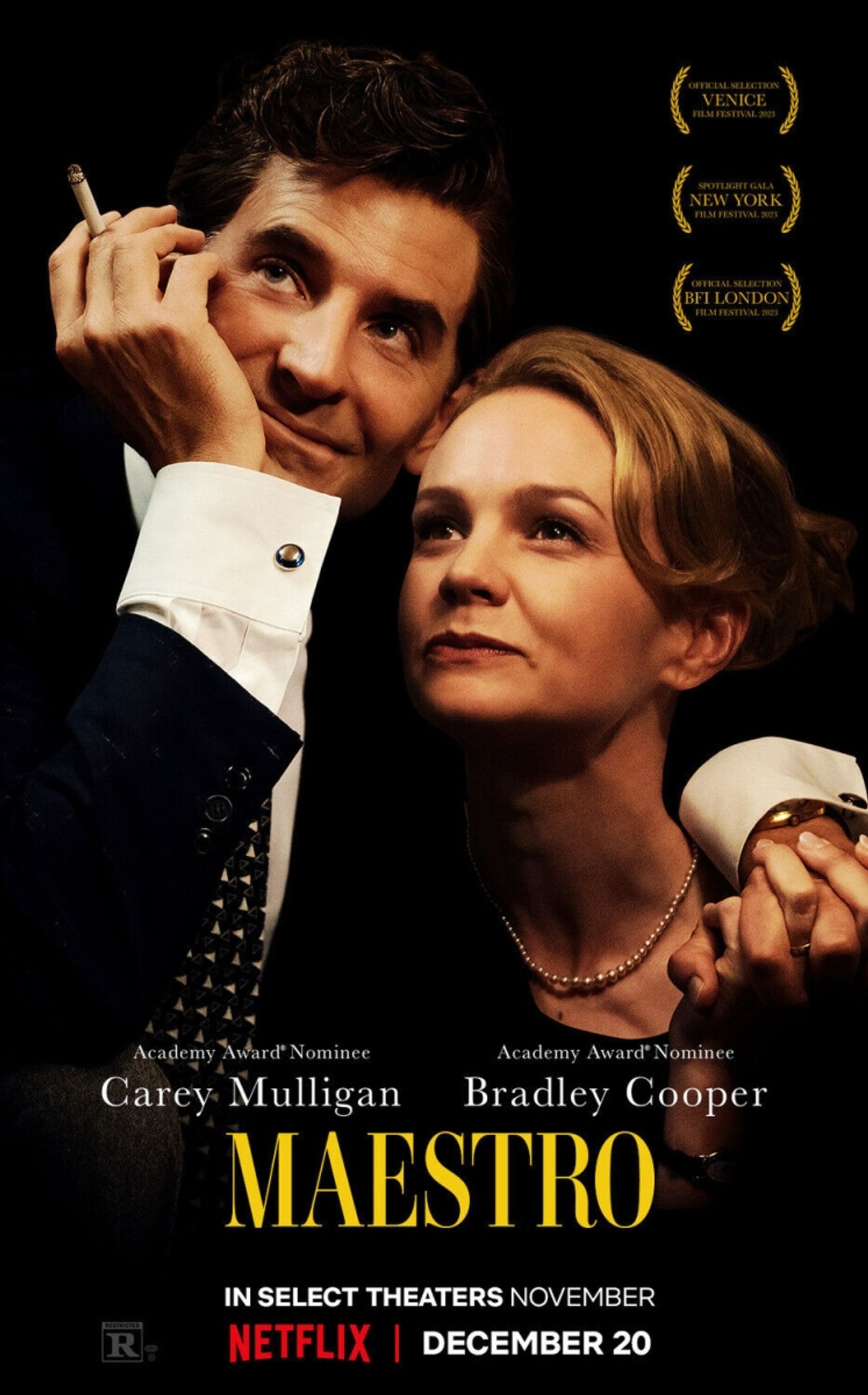Streaming Review: Bradley Cooper's Latest Director Endeavor Comes To NETFLIX & Shows He, Too, Is Becoming A MAESTRO
Lenny & Felicia Sitting In A Tree… Looking To Find Each Other.

 Welcome to another installment of Little Bobby’s thoughts on some streaming Entertainment coming to you this time from the fab children at NETFLIX! So jump in the stream with us, and let’s see if our rainbow lands on a pot of gold…
Welcome to another installment of Little Bobby’s thoughts on some streaming Entertainment coming to you this time from the fab children at NETFLIX! So jump in the stream with us, and let’s see if our rainbow lands on a pot of gold…
Well, dear ones, with “Maestro,” Bradley Cooper tells the love story of conductor/composer/musical innovator Leonard Bernstein and his 27-year marriage to actress Felicia Montealegre in some of the most sweepingly operatic ways possible, through the use of broad camera work, changing aspect ratios, surprising angles, and skips and jumps in time (and film colors) that punch holes in what we have come to understand is the typical linear biopic. The writer/director/star crafts a Bernstein that is layered and complicated, professionally and personally, and equally pieces together a film that jumps-cuts through the important events that happened in the man’s life during that controversial relationship. Very little in the film takes place before their first meeting (in 1946) or after their final goodbye (in 1978). Superfluous dross has been cut away, such as the historical fact that Lenny & Felicia were engaged but broke it off, then got back together after the man she was with died, along with many other linear facts of the “first they went here and then they did this, then they went there and did some-other-darn-thing” types of history highlights that one can read in a book or sleep through in class. One of the ways the film falls short is the fact that Cooper’s version of events is, indeed, chock-a-block full of highlights, all of which belong to Lenny and none to Felicia, an accomplished actress, and an activist who even went to jail fighting for causes of freedom and civil rights. The focus, though, is the relationship between this couple who came together in the knowledge of their love, despite Bernstein’s rather well-known, and even open, queerness.
Cooper and co-writer Josh Singer (“Spotlight”) do not shy away from the man’s boy-on-boy encounters, and it is largely because he is honest with his wife that their marriage succeeds, until it doesn’t. With Felicia assuring Leonard, at the outset, that she knows “exactly” who he is and they are free to live their own way, Maestro builds on the question of “how can these two individuals find happiness?” and answers it with the bumpy road of love. Felicia loves and respects Lenny, as she loves and respects the New York intelligentsia that become their friends, some of whom Lenny either has slept with or, in the case of Tommy Cothran (played by Gideon Glick), is sleeping with. Through the use of overlapping segue, Orson Welles-like deep focus distance shots, lingering close-ups where actors are displayed listening more than they are talking, impressionistic movements in and out of claustrophobic and expansive settings (those changing aspect ratios), and the compression of time between the big accomplishments that happened for Bernstein during the period of his and Montealegre relationship, Cooper creates much of the feeling Felicia must have had within her marriage. Running from one scene directly into the next and in a whole other setting… here we are at a party and now we take hands and run to a Greenwich Village Theatre and next to a Broadway stage might sound dizzying, but this movement and compression deepen what is happening from the first falling in love through the descent of reality to the final, painful farewell. This also makes Maestro pretty breathtaking, throughout, from an artistic POV, as well as deepens its emotional core, most of which Cooper wisely writes on Carey Mulligan’s face. “There is a price for being in my brother’s orbit…” says the marvelous Sarah Silverman as the great man’s sister, Shirley Bernstein, and it is a price the audience comes to understand through the filmmaking.
The camera work, costumes, and design all evoke each period we pass through of Bernstein’s life, most of it in the most sumptuously glamorous ways. The Bernstiens were wealthy creative artists and NYC socialites, so there is no grit or grime to their story - only glitz, glamour, music, and flashbulbs. The film itself changes look and feel to fit not only the historical times but also the styles of filmmaking for those times. Oscar nominee Matthew Libatique creates the widescreen brilliant colors of the opening moments in Lenny’s home near the end of his life, only to switch without warning to the harsh contrast black & white Academy Ratio of his 1943 debut conducting of the New York Philharmonic. A nod must also be given to editor Michelle Tesoro, who creates those aforementioned “dizzying transitions.” With all of those brush strokes in place, Cooper was free to get up close to his film and get the details right in his performance. He spent 6 years learning to conduct in the fashion of Bernstein, and his recreation of leading the London Symphony Orchestra in Mahler’s “Resurrection” Symphony No. 2 at Ely Cathedral in 1973 is rapturous, but this isn’t the story of the trials, tribulations and triumphs of the man’s career. The obstacles that he faces throughout the story are not professional, but deeply personal, and even more so for Felicia.
Their relationship is complicated, and, as we eavesdrop on their life and their parties, we hear Cooper’s dialogue almost as a patchwork quilt moving from the casual to the biting and back again without a lot of time to think it over. After catching her husband kissing Tommy Cothran she says, “Fix your hair. You’re getting sloppy.” Reflecting on this, one realizes it’s not about his hair, his drinking, or even his kissing boys, it's about his being indiscreet and making her look like a fool to the unenlightened. If she stumbled upon that scene, anyone could have… including their children. Together, Cooper and Mulligan create an infectious chemistry from their first meeting through falling in love, and Cooper the director wisely lets these scenes, and later the couple’s storms, play out in long, single master shots. Their love for each other feels genuine, and Mulligan is magnificent in elevating the role out of Lenny’s shadow (something that was probably harder in real life), and it is the scenes where she shows you how she feels, rather than speaks of how she feels, that she and her director have drawn the character in finer detail than in her giving vent. The moments where she says nothing and allows us to paint on her canvas speak volumes. It is the emotions she struggles to NOT show, as she must share her husband with the world and with a series of men, that hurt the most.
Mark Bridges' sophisticated costumes are one of the biggest tools in moving the audience through each rich era of the film, and they join seamlessly with Kevin Thompson’s production design (with set decor by Rena DeAngelo), and Libatique’s cinematography. Much has been made of Cooper’s facial alteration to make him look more like his subject, and one can form one’s own opinion of THE NOSE (which Bernstein’s children have said was fine), but, for this writer, the question at hand for makeup designer Kazu Hiro (and director Cooper) is why was nothing done in the makeup chair OR in post to alter Cooper’s famously sparkling sky blues eyes to the more muted combination of brown, green, and gold hazel that was Bernstein’s in life?
In all, Maestro is the fast-paced chronicle of a giant living a giant life, as told through a love (or love-ish) story. Cooper explains very little as he goes along, and the titans that touch the film, such as Brian Klugman as equally famous composer Aaron Copland, one of Bernstein’s closest friends, pass through the movie in the blink of an eye, as do the important professional events in the big man’s life. Cooper deals in feelings rather than events, and it is this that makes his movie potent, with the complications that come with genius. Bernstein is the focus of Maestro, but the film only has meaning through his relationship with Felicia. Everyone else is a patch in their quilt and, while brilliantly played by the likes of Silverman, Glick, and Matt Bomer (as Lenny’s first love, clarinetist David Oppenheim), they remain separate patches making up the couple’s world, and it is the two of them, and not the man’s career, that makes up Maestro which we happily give...
4 ½ Out Of 5 Rainbows
This One Is Totally Worth Checking Out On NETFLIX: HERE
Hear The Score To MAESTRO On The Spotifies: HERE
AND
Read, Hear & See All About MAESTRO On The Official Webbysite: HERE

Reader Reviews
Videos

